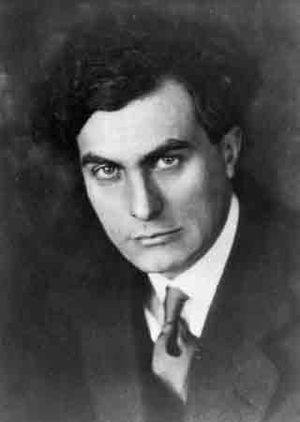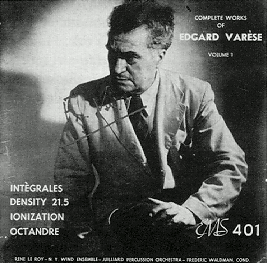Difference between revisions of "Edgard Varèse"
m (Work In Progress) |
|||
| Line 1: | Line 1: | ||
| − | [[Image:Youngvarese.jpg|thumb| | + | [[Edgard Varèse]] (Born Paris 22nd December 1883 - Died New York 6th November 1965) was a 20th century composer and musical innovator often credited as the father of electronic music. |
| − | [[Edgard Varèse]] | + | |
| + | <blockquote>"Although the Christian name Edgar is spelt without a second d in French, a d appears in the official certificate confirming the birth of Varèse. So, except during a brief period of his life, Varèse always signed his name with a second d."</blockquote> | ||
| + | <div align=right>- Fernand Ouellette, Edgard Varèse, a musical biography (1966)</div> | ||
| + | |||
| + | |||
| + | |||
| + | [[Image:Youngvarese.jpg|thumb|left|Edgard Varèse]][[Edgard Varèse|Varèse]] was born a few days after [[Anton Webern]]. The son of an authoritarian father who would leave his son to be raised by his grandparents while pursuing his engineering career. Like Zappa [[Edgard Varèse|Varèse]] had a peripatetic youth residing in Villars, Paris, Berlin and Turin. | ||
| + | |||
| + | Growing up in a world where he rarely heard music he was fascinated by sound - the whistle of a train, the sounds of the wind, rivers and an industrial city. | ||
| + | |||
| + | By 1904 he was a student at the [[wikipedia:Schola Cantorum|Schola Cantorum]] and later at the [[wikipedia:Conservatoire de Paris|Paris Conservatoire]]. | ||
| + | |||
| + | In November 1907 [[Edgard Varèse|Varèse]] married the actress [[wikipedia:Suzanne Bing|Suzanne Bing]], whom he had met at the Conservatoire and they moved to Berlin. They had a daughter but were divorced by 1913 so they could pursue their own careers. She moved to America with her theatre company, spending a period in New York where they had a two year residency at a Garrick Theatre but not the [[Garrick Theater]]. In 1915 [[Edgard Varèse|Varèse]] moved to America. | ||
| + | |||
| + | [[Edgard Varèse|Varèse]] worked at promoting his vision of a new electronic music and conducting. He founded the short lived New World Orchestra, and composed Amériques which he finished in 1921 but it would not be performed for another five years. | ||
| + | |||
| + | During the summer of 1921 [[Edgard Varèse|Varèse]] and [[wikipedia:Carlos Salzedo|Carlos Salzedo]] set up the International Composers' Guild to promote the performance of contemporary music. Their manifesto stated: | ||
| + | |||
| + | <blockquote>Dying is the privilege of the weary. The present day composers refuse to die. They have realized the necessity of banding together and fighting for the right of each individual to secure a fair and free presentation of his work</blockquote> | ||
| + | |||
| + | During the next six years the ICG presented works by fifty six composers including Schoenberg, Stravinsky, Webern, Berg, Hindemith and Monegger. During this period [[Edgard Varèse|Varèse]] composed Offrandes, Hyperprism, Octandre, and Intégrales. | ||
| + | |||
| + | In November 1927 [[Edgard Varèse|Varèse]] dissolved the ICG and established the Pan American Association of Composers with [[Nicolas Slonimsky]] as it's principal conductor. | ||
| + | |||
| + | [[Edgard Varèse|Varèse]] returned to Paris in 1928 where he set about modifying the score of Amériques to include the [[wikipedia:Ondes Martenot|Ondes Martenot]] and, around 1930, composed Ionisation for percussion instruments. | ||
| + | |||
| + | |||
| + | |||
| + | |||
| + | to be continued.... | ||
| + | |||
| + | |||
| − | |||
Mentioned during "[[Star Special]]", [[Frank Zappa]] as a guest DJ on BBC Radio 1 in 1980. | Mentioned during "[[Star Special]]", [[Frank Zappa]] as a guest DJ on BBC Radio 1 in 1980. | ||
| Line 10: | Line 40: | ||
FZ in "[[Son of Suzy Creamcheese]]", [[Robert Shelton]], [[The New York Times]], 1966: "''It – Varèse's '[[Ameriques|Amériques]]' – blows my mind. It’s my favorite top-40 record''". | FZ in "[[Son of Suzy Creamcheese]]", [[Robert Shelton]], [[The New York Times]], 1966: "''It – Varèse's '[[Ameriques|Amériques]]' – blows my mind. It’s my favorite top-40 record''". | ||
| − | In 1971 FZ wrote [[Edgard Varèse: The Idol of My Youth]] about his discovery of, and enthusiasm for, the music of Varèse. | + | In 1971 FZ wrote [[Edgard Varèse: The Idol of My Youth]] about his discovery of, and enthusiasm for, the music of Varèse.[[Image:Ems401.gif|thumb|right|EMS 401]] |
Zappa is interviewed for the radio documentary [http://www.archive.org/stream/VareseSonicLiberation Varèse:Sonic Liberation] (MP3 stream (58 minutes)) | Zappa is interviewed for the radio documentary [http://www.archive.org/stream/VareseSonicLiberation Varèse:Sonic Liberation] (MP3 stream (58 minutes)) | ||
| Line 27: | Line 57: | ||
* He looked, and sometimes acted, like an eccentric, mad professor | * He looked, and sometimes acted, like an eccentric, mad professor | ||
| − | + | ||
| + | |||
| + | [[Edgard Varèse]] is name-checked on the cover of "[[Freak Out!]]" (1966) under the heading "These People Have Contributed Materially In Many Ways To Make Our Music What It Is. Please Do Not Hold It Against Them". He is also mentioned in "[[The Real Frank Zappa Book]]" (1989). | ||
==See Also== | ==See Also== | ||
Revision as of 08:25, 10 July 2007
Edgard Varèse (Born Paris 22nd December 1883 - Died New York 6th November 1965) was a 20th century composer and musical innovator often credited as the father of electronic music.
"Although the Christian name Edgar is spelt without a second d in French, a d appears in the official certificate confirming the birth of Varèse. So, except during a brief period of his life, Varèse always signed his name with a second d."
Varèse was born a few days after Anton Webern. The son of an authoritarian father who would leave his son to be raised by his grandparents while pursuing his engineering career. Like Zappa Varèse had a peripatetic youth residing in Villars, Paris, Berlin and Turin.
Growing up in a world where he rarely heard music he was fascinated by sound - the whistle of a train, the sounds of the wind, rivers and an industrial city.
By 1904 he was a student at the Schola Cantorum and later at the Paris Conservatoire.
In November 1907 Varèse married the actress Suzanne Bing, whom he had met at the Conservatoire and they moved to Berlin. They had a daughter but were divorced by 1913 so they could pursue their own careers. She moved to America with her theatre company, spending a period in New York where they had a two year residency at a Garrick Theatre but not the Garrick Theater. In 1915 Varèse moved to America.
Varèse worked at promoting his vision of a new electronic music and conducting. He founded the short lived New World Orchestra, and composed Amériques which he finished in 1921 but it would not be performed for another five years.
During the summer of 1921 Varèse and Carlos Salzedo set up the International Composers' Guild to promote the performance of contemporary music. Their manifesto stated:
Dying is the privilege of the weary. The present day composers refuse to die. They have realized the necessity of banding together and fighting for the right of each individual to secure a fair and free presentation of his work
During the next six years the ICG presented works by fifty six composers including Schoenberg, Stravinsky, Webern, Berg, Hindemith and Monegger. During this period Varèse composed Offrandes, Hyperprism, Octandre, and Intégrales.
In November 1927 Varèse dissolved the ICG and established the Pan American Association of Composers with Nicolas Slonimsky as it's principal conductor.
Varèse returned to Paris in 1928 where he set about modifying the score of Amériques to include the Ondes Martenot and, around 1930, composed Ionisation for percussion instruments.
to be continued....
Mentioned during "Star Special", Frank Zappa as a guest DJ on BBC Radio 1 in 1980.
"Octandre" was one of the 10 records FZ selected (in 1989) for the American radio show Castaway's Choice, hosted by John McNally.
FZ in "Son of Suzy Creamcheese", Robert Shelton, The New York Times, 1966: "It – Varèse's 'Amériques' – blows my mind. It’s my favorite top-40 record".
In 1971 FZ wrote Edgard Varèse: The Idol of My Youth about his discovery of, and enthusiasm for, the music of Varèse.
Zappa is interviewed for the radio documentary Varèse:Sonic Liberation (MP3 stream (58 minutes))
"I long for instruments obedient to my thought and whim, with their contribution of a whole new world of unsuspected sounds, which will lend themselves to the exigencies of my inner rhythm." – Varèse in 1917
From "BBC.co.uk - Music Profiles: Edgard Varèse" (http://www.bbc.co.uk/music/profiles/varese.shtml): The highly influential French avant-garde composer who settled in America. Ahead of his time, the quest to free sound from the limitations of normal instruments led Varèse to combine technology with art, focussing on percussion instruments and electronics, taped sounds, loud speakers, sirens, dissonance and extremes of contrast.
Varèse in one minute (also from http://www.bbc.co.uk/music/profiles/varese.shtml):
- Pioneering French composer who lived in New York
- He wrote carefully organised pieces that explore a thin line between music and noise
- Introduced Debussy to Schoenberg's music, and was a close friend of Busoni
- Ionisation was the first piece to be written for a percussion ensemble, and also included a siren
- The premiere of his Hyperprism scandalized New York in 1923
- Varèse was an early exponent of electronic music with his Déserts and Poème Electronique
- He looked, and sometimes acted, like an eccentric, mad professor
Edgard Varèse is name-checked on the cover of "Freak Out!" (1966) under the heading "These People Have Contributed Materially In Many Ways To Make Our Music What It Is. Please Do Not Hold It Against Them". He is also mentioned in "The Real Frank Zappa Book" (1989).

